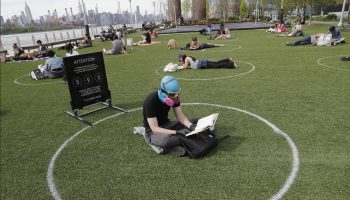Fake news is not a new phenomenon. Inaccurate or partial truths have been spread in the media for hundreds of years, be that propaganda or overtly biased news. Yet, fake news distributed online continues to cause problems in social and political realms. As we saw during the 2016 American presidential election, fake news content can influence citizens’ opinions and alter their behaviour.
Gunther, Beck, and Nisbet from Ohio State University conducted a study in 2016-2017 observing the influence and impact fake news had on the decisions of voters during the American election. They concluded that fake news “most likely did have a substantial impact on the voting decisions.”
Similarly, a recent Oxford University study found that up to a quarter of the political links shared on Twitter in France during the election were spreading inaccurate information.
However, it is important to note the complexity of voting decisions, as fake news would not have been the only determining factor. The influence of fake news on citizens’ beliefs has ignited the debate around the best method to combat it.
In Public Opinion, (1922) American political commentator Walter Lippmann proposed an “intelligence bureau” to identify false information, propaganda, or information the public was better off not knowing. This proposed intelligence bureau would be implemented and function through government legislation. Essentially, Lippmann believed average citizens weren’t capable of understanding politics and should be shielded from complex information. This seems to be the position some nations are adopting in the fight against fake news.
In China, legislation has been implemented to combat fake news. The Chinese government states that around 500 million “fake news posts” have been blocked by WeChat administrators, a popular Chinese social media platform. This legislation was strategically used to strengthen and legitimise government censorship.
Extreme legislations have also been introduced in Malaysia. The Anti-Fake News Act 2018 allows a maximum penalty of up to six years for anybody who publishes “…any news, information, data and reports, which is or are wholly or partly false”. This loose definition can be attributed to any information that the government dislikes or disagrees with. Salah Salem Saleh Sulaiman was imprisoned after posting a Youtube video criticising the slow police response after a shooting in Kuala Lumpur early 2018. He was the first person to be prosecuted under the new law. After pleading guilty to the charge, he was imprisoned for a month at the end of April this year.
As Lippmann said, “while men are willing to admit that there are two sides to a ‘question,’ they do not believe that there are two sides to what they regard as a ‘fact.’”
So, the major issue with implementing legislation to combat fake news, proposes the question: who would hold the power to determine the one truth?
As this would be outlined in legislation, government bodies would have the power to decide the truth.
This would inevitably lead to widespread censorship and the limiting of freedom of speech.
This legislation would increase the homogeneity in media and discredit alternative opinions and facts.
Donald Trump has continued to use accusations of fake news to discredit alternative perspectives and information he disagrees with. Similarly, the Burmese government has claimed recent images of human rights violations are depicting the country inaccurately. If governments are claiming that certain information they dislike is fake news, legislation against fake news would grant them the power to silence any criticisms.
Instead of Australia introducing any legislation to stop the spread of fake news, critical media consumption skills should be taught and improved. This will also have a variety of social benefits on top of fighting fake news. Simple habit changes can help users detect fake news. These include reading a variety of news publications, reading cited sources, and reading website domain names. For example, look out for “.com.co” at the end of the domain name, as this is a major indicator of an illegitimate website.
Fake news is not new and government legislation won’t stop fake news. As there will always be misleading information online, it is up to the user to develop the skills to determine the accuracy of information. It is also the responsibility of journalists to fact check information before publishing it.
Ultimately, fake news is a major issue, but we should not legislate censorship. We should not legislate the idea that one truth exists. We should not let any government decide which truth we can read, that in itself would be fake news.
Written by Madeline Gourlay

